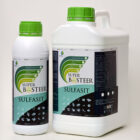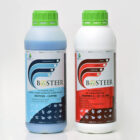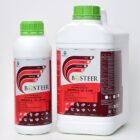Boron – Its role in nutrition: In cases where boron cannot be taken due to deficiency or excess calcium in the soil; the top buds do not last, if it does, the small leaves dry up and the tip of the branch becomes dry. On young fruits, violet-colored spots are seen in places. Here, the crust thickens and necrosis penetrates into the flesh. In slight deficiencies, the shell becomes rough, there is not much damage inside.
Excess boron has a toxic effect on trees. Especially in irrigation with a sprinkler system with debt-rich water, burns occur on the edges of the old leaves, and this may cause the leaves to fall in the future.
Although the malfunctions caused by its deficiency or excess are not known, it has been observed that the trees do not show a normal growth if this nutrient is not present.
Zinc – Its role in nutrition: Deficiency; It is known that the leaves are small and the internodes are short in fruit trees, so they take the form of rosettes. The colors of the leaves are also not normal and show signs of chlorosis between the veins. The fruits remain small and are worthless. Zinc deficiency is very common in olives, peaches, apples and oranges. There is an opposition between this element and phosphorus. Due to the excess of zinc, malfunctions have not been observed in fruit growing.
BOSTEER 4-15-0 5% BORON 5% ZINC DEFINITELY OVERCOME THESE DEFICIENCIES.




